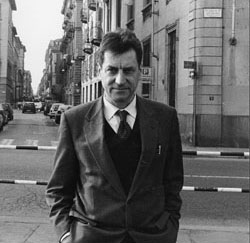| Claudio
Magris
|
|
 |
was born in 1939 in Trieste and
took his degree in German in 1962. His first book The Habsburg Myth in
Modern Austrian Literature rediscovered central European literature. His
journalistic writings have been collected in Behind Words, 1978,
and Ithaca and Beyond, 1982. He has written essays on Hoffmann,
Ibsen, Svevo, Musil, Hesse and Borges. His novels include Inferences
on a Sabre, 1984, The Danube, 1986, and A Different Sea,
1991. Microcosmos received the Strega Prize in 1997.
Narodil se v roce 1939 v Terstu. Nějaký čas přednášel germanistiku na univerzitě v Turínu a nyní je profesorem německé literatury na univerzitě v Terstu. Publikoval řadu esejistických prací z oblasti literárních a kulturních dějin, např. Habsburský mýtus v moderní rakouské literatuře, 1963, Daleko odkud, Joseph Roth a východní židovská tradice, 1971, Ithaka a za ní, 1982, i beletristických Soud o šavli, 1984, Jiné moře, 1991, či divadelní hru Stadelmann, 1998. Doma i v zahraničí ho nesporně nejvíce proslavil „sentimentální cestopis“ Dunaj, 1986, (česky v nakl. Odeon, 1992, v překladu Kateřiny Vinšové a Bohumíra Klípy). V loňském roce vydal další místopisnou knihu tohoto druhu Mikrokosmy, za niž byl vyznamenán italskou literární cenou Strega. |
| Danube
The Danube is often enveloped
in a symbolic anti-German aura. It is the river along which different peoples
meet and mingle and crossbreed, rather than being, as the Rhine is, a mythical
custodian of the purity of the race. It is the river of Vienna, Bratislava,
Budapest, Belgrade and of Dacia, the river which – as Ocean encircled the
world of the Greeks – embraces the Austria of the Habsburgs, the myth and
ideology of which have been symbolised by a multiple, supranational culture.
It embraces the empire in which the sovereign addressed himself to ‘my
peoples’ and the national anthem was sung in eleven different tongues.
The Danube is German-Magyar-Slavic-Romanic-Jewish Central Europe, polemi-cally
opposed to the Germanic Reich; it is a ‘hinternational’ ecumene, for which
in Prague Johannes Urzidil praised it; it is a hinterworld ‘behind the
nations’.
|
|